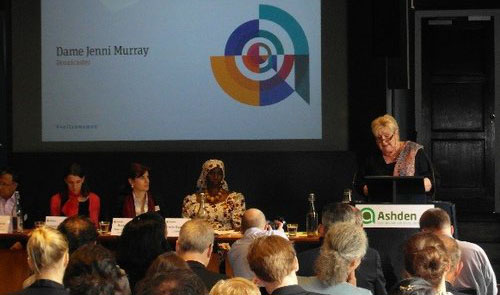Dame Jenni Murray hosting the afternoon panel at the Ashden Conference “Fully Charged: Sustainable Energy for Women and Girls” Photo: ENERGIA
Every year, the Ashden Awards recognize and support some of the world’s best green trailblazers offering sustainable energy solutions. The awards allow organizations to accelerate their work through an International Support Programme. This year, the event recognized a new category: Sustainable Energy, Women and Girls.
Prior to the Award Ceremony on May 20th, a conference, co-hosted by ENERGIA, was organized related to this new category. During a morning panel session, chaired by Dr Anne Wheldon, Knowledge and Research Adviser at Ashden, all five International Award winners were given the opportunity to present their projects. Afterwards, a lively discussion involving the panel and the audience followed. What drew attention from the start was the diversity in concepts and geographical locations of the award winners.
“This award is a big honour for us. It gives us a lot of confidence about our work and a lot of credibility towards our stakeholders, which is important to scale up” said Neha Juneja, CEO of Greenway Grameen, the first Sustainable Energy for Women and Girls award winner. “Our stove produces 70% less smoke and uses 65% less fuel than traditional mud stoves.” So far, her company has produced 140,000 cookstoves to benefit 700,000 people in rural India.
Off.Grid:Electric from Tanzania introduced their mobile solar power solutions, offering an affordable lighting alternative and innovative payment system. “We take away worries and the dangers of kerosene use by delivering a service. It’s a very small thing, but it has a big impact”, Raphael Roberts emphasized while talking about pay-to-go solar. He is clear about their contribution to women’s empowerment – it also involves men. “We have to deal with masculinity. We can empower women, but when they get home… men are the problem, because they are the decision-makers.”
The situation in Myanmar proved to be different for Proximity Designs. “Women own property here. They make the final decisions in the household”, Jim Taylor said. His organization has been the first to introduce treadle pumps, solar irrigation and other sustainable agriculture technologies to farmers in that country. Infosys from India demonstrated how they have been decreasing electricity consumption, but warned that progress has implications. “Time saved sometimes means more burden [for women]. What does the user want?” Rohan Parikh posed.
The importance of customer-focus is something that Carlo Talamanca from Sustainable Green Fuel Enterprise (SGFE) in Cambodia agreed with. “Your customers are the experts. They will tell you whether it leaves too much ash, or sparks too much. Whether they burn long enough, or if they break too easily.” SGFE turns leftover coconut shells and other waste into clean-burning charcoal briquettes that are used as cooking fuel in homes and restaurants.
The afternoon panel session was opened by its chair, Dame Jenni Murray of BBC Radio 4’s Women’s Hour fame. ENERGIA’s Sheila Oparaocha talked about the female face of energy poverty, making it clear that this issue goes far beyond technology. “There is a cultural barrier. How can we engage women?” she asked the audience. She then offered insights into possible adaptions to training options: make them shorter, closer to home and provide childcare for participating women.
By the end of the day, the key message was clear: sustainable energy solutions are not something you can just hand over to people and be done with. It requires attention and continuous feedback with the customer so that everyone’s voice can appropriately be taken into account. “This is about the diversity of problems, about dealing with someone’s livelihood,” Richenda van Leeuwen from the UN Foundation stated. That is precisely what the Ashden Awards are all about: displaying cases and issues on the ground leading to solutions that work in more than one way.
Two weeks later, at the Sustainable Energy for All International Forum held in New York, Ms. Chhavi Sharma, Ashden’s International Programme Manager, was invited by ENERGIA, who hosted one of the panel discussions, to present the outcomes of the discussions.











Follow us on: